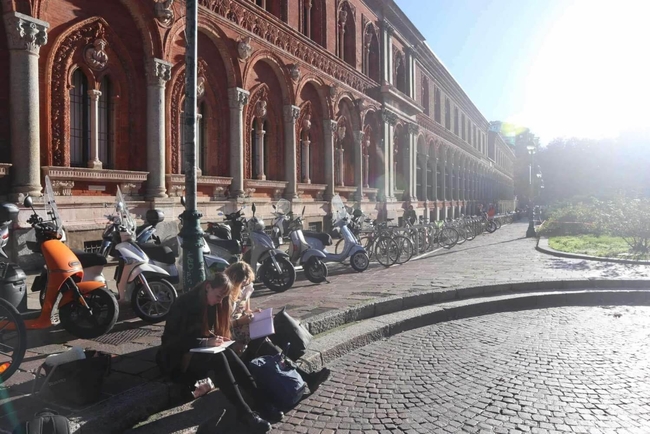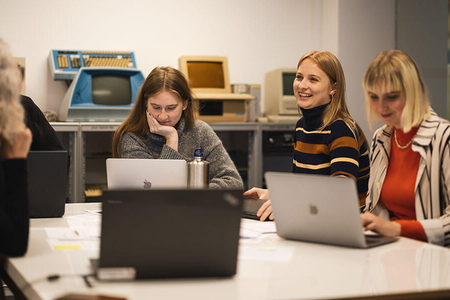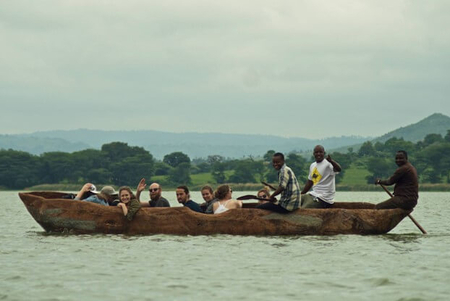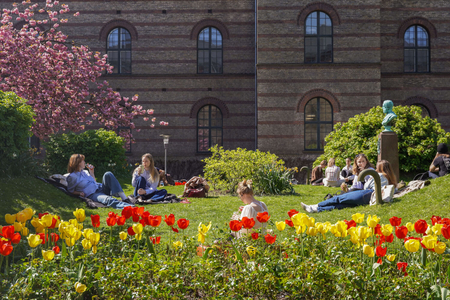About the programme
Anthropology is about the social life of people, about cultures and societies all over the world. When you study a master's degree in anthropology, you will be trained to find new perspectives on what is often taken for granted and why people act the way they do.
What makes the programme at UCPH unique?
The master's program in anthropology explores all aspects of human life and is an interdisciplinary education. It includes cultural, social and biological dimensions and provides a comprehensive understanding of human life. Anthropology compares cultures across time and space, enabling generalizations and theories with universal relevance.Who studies this programme?
You can be admitted to the candidate in anthropology if you meet the program's entry requirements. You can read more about application and admission further down the page.Considering studying at UCPH this September?
Apply by 15 January if you are an applicant from outside the EU/EEA/Switzerland. Apply by 1 March if you are from the EUAdmission and application
To apply for admission to this master's degree programme, you must have completed a qualifying bachelor’s degree or a similar Danish or international degree programme which is assessed to be relevant. Apply for admission via the application portal.
Below, you can read more about admission requirements and which documents to upload in the application portal.
Academic admission requirements
Here you'll find the different academic requirements depending on which qualifying degree you hold.
Academic admission requirements
If you hold one of the degrees listed below and hold documentary proof that you meet any and all language requirements, you are considered to meet all academic admission requirements and have direct access to apply to the master’s degree programme in Anthropology.
- BSc in Anthropology from the University of Copenhagen
- BSc in Anthropology from Aarhus University
- BSc in European Ethnology from the University of Copenhagen, provided that the applicant has also passed a minimum of 7,5 ECTS anthropological courses as part of the bachelor's degree programme
To be admitted to the programme, you must hold a recent and relevant bachelor’s degree and meet the language requirements.
Academic requirements
Applicants must hold a bachelor's degree in Anthropology or a corresponding bachelor’s degree.
In addition, the following requirements must be met:
- The student must have a Bachelor's degree at the same level as the Bachelor's degree programme in Anthropology at the University of Copenhagen.
- The Bachelor's degree programme must include a minimum of 30 ECTS credits on courses relevant to Anthropology, from a Bachelor’s degree programme in Anthropology or the equivalent.
- English language proficiency corresponding to at least the Danish upper secondary school 'English level B (For information on how to meet the language requirements, please click here).
The following Professional Bachelor's degrees do not qualify for admission and will not be taken into consideration:
- Diakoni og socialpædagogik
- Kristendom, kommunikation og kultur
- Lærer i folkeskolen
- Natur- og kulturformidling
- Pædagog
- Global Nutrition and Health
- Ernæring og sundhed
- Sygeplejerske
- Innovation og entrepreneurship
- Socialrådgiver
- Offentlig Administration
- Design og business
- TV- og medietilrettelæggelse
The list is not exhaustive.
Language requirements
You are required to document that you fulfil the language requirement English B, unless you have a legal right of admission to the programme you are applying for.
Please note that you must have the documentation ready by the application deadline.
Application deadlines
Study start in September
1 March at 23:59
Application deadline for Danish applicants and applicants from within the EU, EEA and Switzerland.
Open for applications from 16 January. You will receive a reply by 10 June.
15 January at 23:59
Application deadline for applicants from outside the EU, EEA and Switzerland.
Open for applications from 15 November. You will receive a reply by 1 May.
Application procedure
Before you apply to the master's degree programme in Anthropology, please make sure to acquaint yourself with all the important information on the application procedure, application deadlines and details about how to apply. Select an option below to read more about your application
If you are a citizen in Denmark, EU, EEA or Switzerland
If you are a citizen in a country outside EU
Have you been enrolled before?
How your application is assessed
Prioritisation of applicants
As the Master’s degree programme only admits a limited number of students each year, meeting the admission requirements does not in itself guarantee admission to the programme. Allocation of student places is based on an overall assessment.
If more applicants than the maximum intake allows for fulfil the admission requirements, a selection will be made on the basis of a comprehensive evaluation, with emphasis on the following criteria:
- General proficiency/marks in the qualifying degree program
- Knowledge of social science methodology. If it is not evident from the diploma and/or transcript that the courses in question are courses in social science methodology, you can attach documentation and explain why these are nonetheless relevant methodology courses.
- Relevant academic experience, including relevant work experience. Describe the academic and work-related experience that you have acquired and its relevance towards the MSc in Anthropology (max. 1 page).
Any improved grades are not considered. This is due to the fact that in Denmark it is not possible to improve grades in courses that has already been passed on the Bachelor's degree programme. Thus, if you have been awarded more than one grade in the same course, we will only consider the grade that you were awarded the first time that you passed the course when calculating your grade point average.
All applicants from non-Danish universities must, consequently, upload a complete transcript showing all examination attempts, the date of each examination attempt and the appurtenant exam result. If the applicant is unable to obtain a complete transcript from the home university, a confirmation that the applicant's transcript does not contain improved grades issued by the current home university is required instead.
Random checks of the applicant's basis for admission may also be made to the home university. In the case of admitted students, any fraudulent information in terms of grades may result in the student being deregistered from the degree programme in case of admission without entitlement.
However, any grade awarded on the basis of an appeal against the original grade will be considered. In this case, it must be clearly stated that this is an improved grade as a result of a complaint. Any such grade must be made available to the Faculty no later than the deadline for applications. Otherwise, the grade can only be considered in subsequent application rounds.
Random checks of the validity of international exam results will be carried out.
If you are in doubt about the rules or have questions about your entry qualifications please contact Student guidance.
If you already have a master's degree from Denmark or another country, you can, in principle, only be admitted to a new degree programme if there are places available on the programme for which you are applying for admission (the master's degree admission rule).
In exceptional cases, we may grant dispensation from the master’s degree admission rule. Read more about the master's degree admission rule and the possibility of applying for dispensation here.
| Admission statistics Anthropology (English) 2025 | |
|---|---|
| Admitted (of which have start in February) | 15 (0) |
| Admission distribution (legal right/other) | 0% / 100% |
| Applicants | 78 |
| Age average | 24 |
| Nationality (dk/international) | 7% / 93% |
| Admission statistics Anthropology (Danish) 2025 | |
|---|---|
| Admitted (of which have start in February) | 59 (0) |
| Admission distribution (legal right/other) | 90% / 10% |
| Applicants | 138 |
| Age average | 26 |
| Nationality (dk/international) | 100% / 0% |
Programme structure
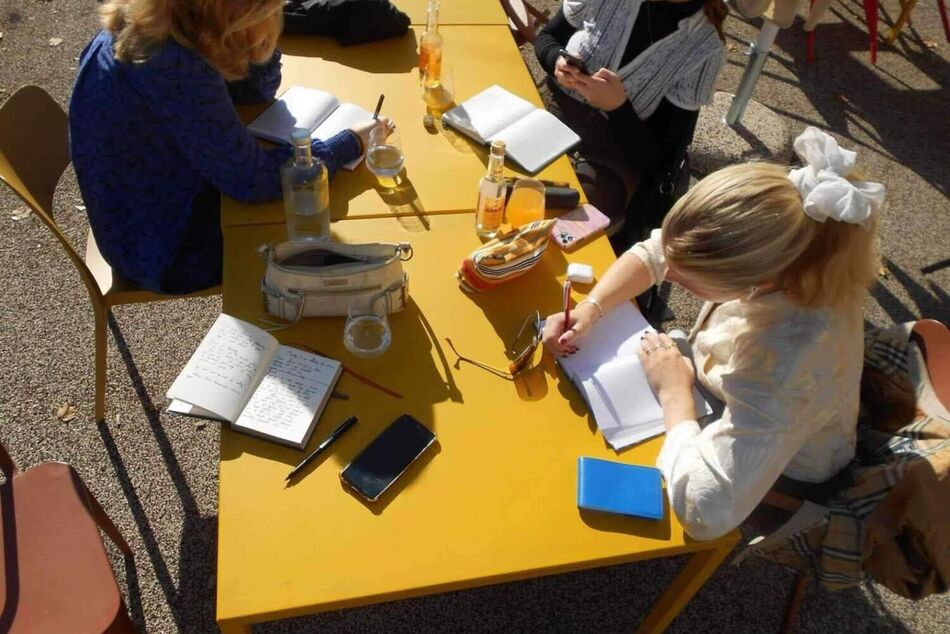
The MSc in Anthropology from the University of Copenhagen is a two-year full-time programme, which consists of a number of courses, fieldwork and a master’s thesis.
You can read about the contents of the courses in the curriculum found at the bottom.
You can choose between a general profile and specializations. The general anthropological profile looks like this:
Year 1
| Semester 1 | Semester 2 |
|---|---|
| Analytical Approaches (15 ECTS) | Anthropological Project Design (15 ECTS) |
| Optional anthropological courses (2 x 7,5 ECTS) | Optional courses (2 x 7,5 ECTS credits) |
Year 2
| Semester 3 | Semester 4 |
|---|---|
| Fieldwork: Ethnography and Analysis (30 ECTS) | Master's thesis (30 ECTS) |
It is possible to do fieldwork in a company or organisation, thereby combining an interest in practical training with fieldwork. This does not change the requirement that thesis data need to be generated through qualitative methods with special emphasis on participant observation and various interview techniques. Therefore, students must ensure that the contract or agreement for the project-oriented work allows time for data collection.
The MSc in Anthropology is capped off with the Master’s thesis. Below is an eclectic list of previous thesis topics to help acquaint you with an idea of what’s possible:
- Creating Consultancy - An Anthropological Analysis of the Need for Process Consultants in the Danish Business World
- Prosperity for All? Competing Narratives of Change in an Ugandan Oil Field
- Cleaning in a Gold Cage - Social and Physical (Im)mobility in the Lives of Undocumented Latinas in California
- Fishing Multiplicities - Ethnographic Moments in the West Fjords of Iceland
- Being Left in Jerusalem. An anthropological analysis of border-making practices among left-wing Jews in West Jerusalem
- “I just want my business back”. An anthropological analysis of livelihoods and justice among internally displaced people in Nairobi, Kenya
The MSc in Anthropology is a full-time study programme. Consequently, you cannot complete the programme as part-time study or online by distance education. This is due to the rule about active participation in the master courses.
Specialisations
Anthropology of Health
With a specialisation in Anthropology of Health you study how human beings’ efforts to secure health and treat illness are shaped by and contingent on local, national, and international institutions and political processes.
Business & Organisational Anthropology
With a specialisation in Business & Organisational Anthropology, you study business activities and life in organisations using anthropological methods and theory.
Programme Curriculum
If you are more interested in the academic content, regulations, and examination requirements, you should consult the curriculum, which serves as the legal foundation for the programme.
There is both a curriculum specific to each degree programme and a general curriculum that applies across the faculty.
Please note that curricula are often revised annually. Any new versions will be published no later than during the spring semester.
Career opportunities
Upon completion of the master’s programme, you will obtain the title Master of Science in Anthropology.
The MSc programme provides students with knowledge about Anthropological theories within the context of the history of anthropology and scientific theory. Furthermore, it addresses the theories' potential practical applications in empirical research. In addition, the MSc programme covers Anthropological methodology, with a particular focus on the ability to adopt critical and reflective positions on the ethical and academic implications of the methodological choices within a field of study.
Students may select specific regional and/or thematic courses that provide in-depth knowledge of Anthropological fields of research, the ethnography of particular regions and regional issues.
The coursework is designed to ensure that students gain in-depth knowledge of Anthropological project planning, with particular focus on Anthropological fieldwork that will form the basis for his/her master's thesis. Particular emphasis is placed upon acquiring ethnographic knowledge about the specific area in which the fieldwork takes place, selecting relevant methodology and gaining theoretical insight related to the thesis.
The anthropological labour market is very dynamic and anthropologists are constantly breaking new ground.
Research and teaching are still important areas of employment, but today the vast majority of anthropologists are employed outside of universities.
The public sector (municipalities, regions, the state and international bodies) has absorbed many anthropologists for both operational and development tasks, but the private labour market is growing rapidly. Here, it is not least the consulting industry and self-employed entrepreneurs who employ anthropologists.
If you look at it thematically, these areas are currently the most important:
- Health
- Organisational development, HR and management
- Development, aid and relief
- User engagement, market analysis and design, social work and urban development
- Press and communication
- Migration and integration
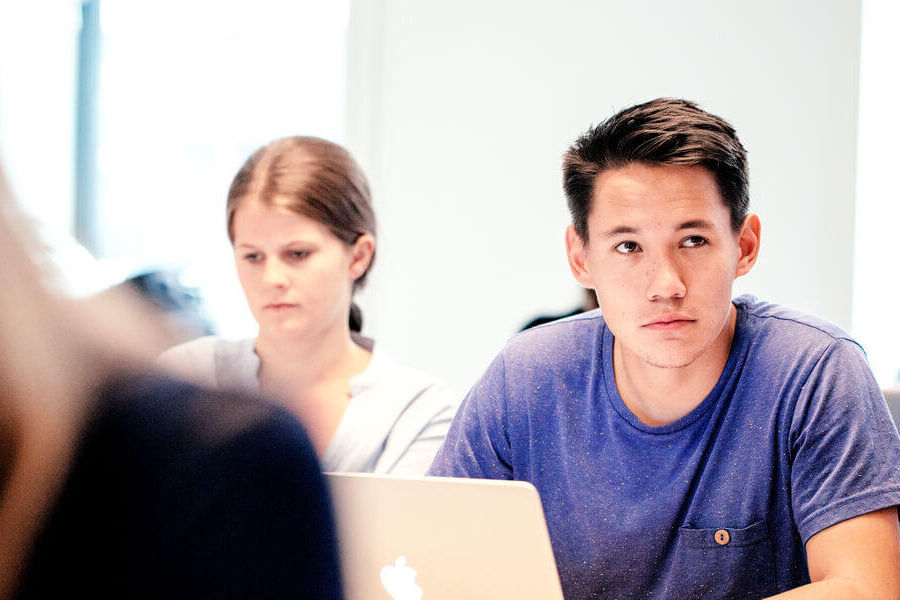
With a Master's degree in Anthropology, you will have the following competences:
- Be equipped with a strong foundation in Anthropology
- Acquire the knowledge required to apply Anthropological methods
- Acquire the skills to evaluate the suitability of methods in relation to a given project including its ethical considerations
- Develop the ability to independently plan and carry out a major Anthropological research project, and to collate and analyse complex empirical material.
- Develop the ability to relate critically to your methodological and theoretical choices and are able to critically evaluate the field-conditions that may influence data-generation.
- Develop the ability to adopt an open approach to the solution of a given problem, and can adapt formulations of the problem and develop new methods where appropriate.
- Learn to structure and communicate your research related arguments in a professional and competitive manner.
Student life
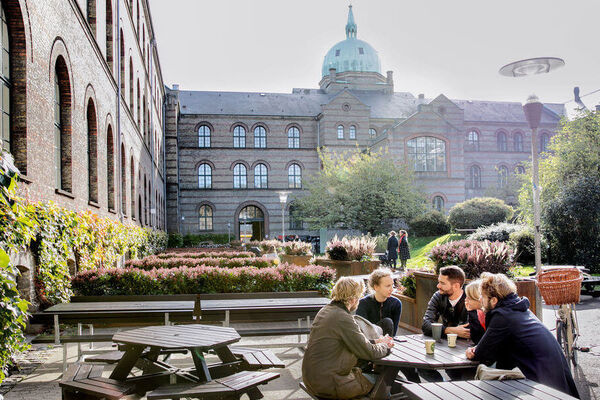
As a student at the Department of Anthropology, you can participate in a great variety of student activities.
You can:
- Become involved in student politics as a member of the student’s council. You can be a part of the party planning committee or volunteer at the student-run breakfast cafe.
- Read books or watch movies of Anthropological relevance in the Anthropological book club and film club, respectively.
- Contribute to the student magazine as a writer or illustrator, or play music, act, build props or sew costumes in the annual Anthro Show.
- Get involved in the Ethnographic Exploratory (EE), where a group of students and teachers collaborate in making extracurricular and experimental projects
There are also several events for International students each semester. The events are arranged at different levels – some are for International students at the Department of Anthropology, some are for International students at the Faculty of Social Science and some are for all International students at the University of Copenhagen.
City Campus
The Faculty of Social Sciences (SAMF) is part of City Campus and is located at the old Municipal Hospital (called Centre for Health and Society, CSS) in central Copenhagen.
Contact student guidance
Questions about study choice and admission
Our student guidance are ready to assist you with answers to your questions about:
- application procedure and the digital application portal
- admission- and language requirements
- documentation
- study life
- career opportunities
- study choice or doubts
Did you not find what you were looking for?
You can find answers to questions most often asked by potential students in the FAQ. Read the FAQ
Questions about the digital application-portal?
Do you have questions about digital application? Check our user guide to the application portal.
In case of technical problems, please contact the IT-support by
- Mail: it-service@adm.ku.dk // Tel: +45 35 32 32 32
Location
- City Campus, Øster Farimagsgade 5, DK-1357 København.
